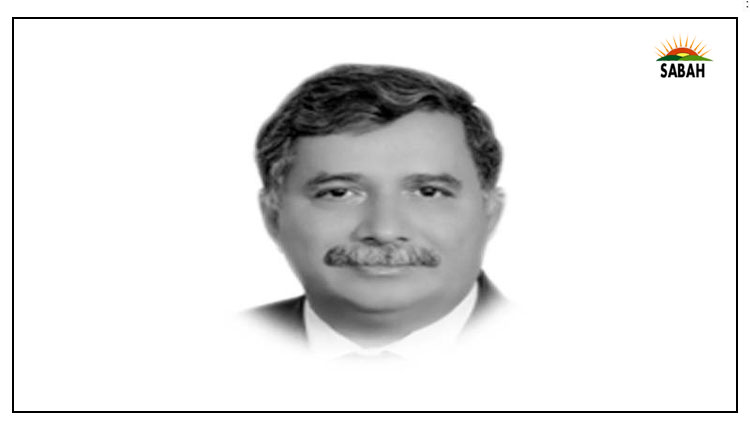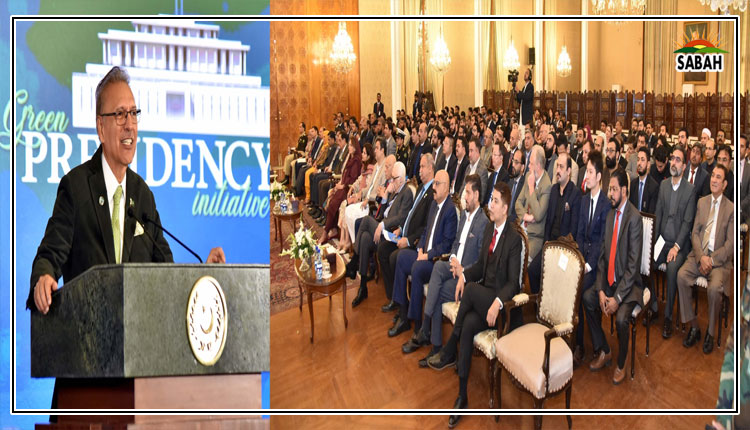Transitioning to renewable energy sources, improving energy efficiency & reforestation key to curb adverse impacts on planet’s climate & ecosystems: President Alvi
ISLAMABAD, Dec 18 (SABAH): President Dr. Arif Alvi on Monday called for improving energy efficiency, adopting sustainable practices, and changing attitudes and priorities to mitigate the adverse impacts of climate change.
“Transitioning to renewable energy sources, improving energy efficiency, and reforestation are key to curb the adverse impacts on the planet’s climate and ecosystems,” President Dr. Arif Alvi said while addressing an event with respect to a project “Green Presidency of Pakistan” here at the Aiwan-e-Sadr.
He said the modern world with changing priorities and attitudes was becoming dangerous which must be stopped to limit the adverse impacts of climate change. The Green Presidency of Pakistan is a flagship initiative under which a one-megawatt solar photovoltaic (PV) system was installed, along with effective implementation of energy conservation and efficiency measures.
President Dr. Arif Alvi said the initiative would result in a reduction in energy usage by Aiwan-e-Sadr by 42.5 percent. This energy savings is equivalent to a reduction of 3,144 tonnes of greenhouse gases or a plantation of 142,090 mature trees.
“It is a matter of great pleasure that, out of 129 projects from around the world, the Green Presidency Project of Pakistan has been conferred with the prestigious award of “International Energy Project of the Year 2023”, he added.
He also expressed gratitude to the Association of Energy Engineers USA for recognizing with the esteemed Best International Energy Project of the Year Award for 2023.
He also called for promoting peace in the world and discouraging wars that were a big cause of deviating the world’s focus on mitigating global warming.
He said despite contributing less than one percent in carbon emission, Pakistan suffered huge losses in last year’s devastating floods that occurred due to global warming and climate change.
He recalled that by mid 20th century, the people were conscious about utilizing the natural resources despite abundant resources, but now the priorities had been changed, the needs and wants had been mixed due to which they started using abundant resources for their ease.
He said the Holy Prophet Muhammad (PBUH) had also taught for consuming the natural resources with utmost care by demonstrating the same in his life.
The president pointed out that the world was witnessing a much-needed transition towards clean energy in the wake of climate change. “The need for plentiful, sustainable energy that doesn’t disrupt the delicate balance of the Earth’s atmosphere may be the single most important issue facing this generation.”
President Dr. Arif Alvi said the decisions to be made and the technologies to be developed over the next few decades would have profound implications for geopolitics, wildlife, food production, and almost every sphere of human endeavor.
He maintained that stakeholders from a range of fields including the architectures could play their role in efficient energy conservation. Further he said the children should also be engaged to make them aware about the value of natural resources and impacts of climate change. The new generation should also be taught this way, he added.
Earlier, the president gave away souvenirs to the project director, head of the project, and representatives of Engro, Huawei and Osaka Lights for their contributions in the project.
In his video message, Executive Director Association of Energy Engineer (AEE) Bill Kent said the Association had been awarding for four decades, the individuals and organizations to recognize their efforts in efficient usage of energy.
He congratulated the team of the project Green Presidency on winning the award as due to their efforts, a remarkable achievement of saving energy of the building by over 42%.
Managing Director National Energy Efficiency and Conservation Authority (NEECA) said an investment of $50 billion would be required to achieve the set goals of producing 60% renewable energy by 2030.












